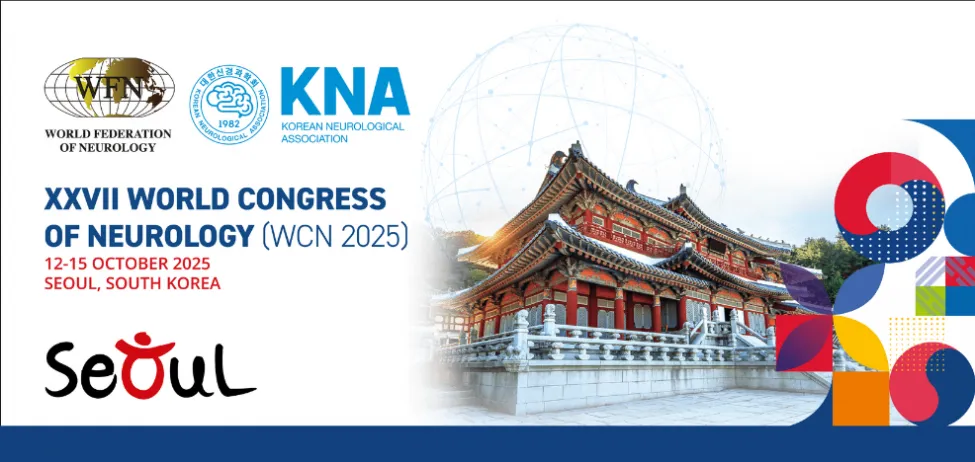We are excited to invite you to the XXVI World Congress of Neurology (WCN 2025), taking place in the dynamic and culturally rich city of Seoul, South Korea, 12-15 October 2025!
Organized by the World Federation of Neurology (WFN) and co-hosted by the Korean Neurological Association (KNA), WCN 2025 offers an unparalleled program designed to engage, educate, and inspire neurologists, researchers, and healthcare professionals from across the globe.
Highlights include teaching courses to sharpen clinical skills, presidential and regional symposia showcasing the latest research and innovations from across the world, “Meet the Professor” sessions for in-depth discussions with the experts, debates on hot topics, and interactive workshops to explore advanced techniques and patient management strategies.
Attendees will have a variety of opportunities to gain practical knowledge, challenge current practices, and connect with international colleagues and global leaders in neurology.
Set against the vibrant backdrop of Seoul, a city renowned for its blend of tradition and innovation, this congress promises not only academic excellence but also a memorable cultural experience.
We look forward to welcoming you to WCN 2025!
|
Abstract Deadline: |
Abstract Topics |
Abstract Awards |
First Inspiring Sessions Unveiled
We’re thrilled to unveil three standout sessions at the XXVII World Congress of Neurology (WCN 2025) in Seoul, South Korea! These sessions are packed with the latest research, clinical insights, and emerging technologies.
Here’s a sneak peek at what you can expect:
Asian And Oceanic Region (AOAN) - Vascular Cognitive Impairment: Advances in Asia And Beyond
12 October, Sunday | 7:00 – 8:00 (GMT+9)
Vascular cognitive impairment (VCI) is a growing global concern, especially in Asia, where it affects a significant proportion of the aging population. This session will provide a comprehensive review of recent advances in the diagnosis, biomarkers, and treatment strategies for VCI, ranging from mild cognitive impairment to full-blown vascular dementia.
Session Highlights:
- Christopher Chen (Singapore): Validation of the Diagnostic Criteria for VCI
- Vincent C. Mok (Hong Kong): Therapeutic Approaches for VCI
- Xin Xu (China): Digital Assessments for VCI
How Digital Technologies are Improving Rare Neurological Disease Management
14 October, Tuesday | 11:00 – 12:30 (GMT+9)
Digital health technologies are revolutionizing the way we understand and treat rare neurological disorders. This session will explore the transformative power of artificial intelligence, big data analytics, and telemedicine in improving diagnosis, treatment, and patient care in rare neurological diseases (RNDs). Discover how these technologies are not only enhancing clinical practice but also paving the way for innovative drug development.
Session Highlights:
- Antonio Federico (Italy): From Narrative to Precision Medicine and AI in RNDs
- Maria Judit J. Molnar (Hungary): Unlocking Hope: Harnessing Digitalization, Big Data, and AI in the Journey of RNDs
- Smail Daoudi (Algeria): The Organization for RNDs in Africa and the Needs for Improving in the Era of Digital Neurology
Key Insights from Therapeutic Innovations in Autoimmune Myasthenia Gravis 15 October, Wednesday | 14:45 – 16:15 (GMT+9)
The treatment of Generalized Myasthenia Gravis (gMG) is undergoing a paradigm shift with the development of targeted biologic therapies. This session will delve into the latest insights into B-cell depletion therapies, complement inhibitors, and FcRn antagonists, which are revolutionizing how we manage and treat this complex autoimmune disorder.
Session Highlights:
- Yoon-Ho Hong (Republic of Korea): Refractory MG and B-Cell Depletion
- Hiroyuki Murai (Japan): Treatment Guidelines and Complement Inhibitors
- Chongbo Zhao (China): The Role of FCRN Antagonists in Transforming the MG Treatment Paradigm
Events Calendar
2026
|
Mar
|
Apr
|
||
|
May
|
Jun
|
Aug
|
|
|
Sep
|
Nov
|
Dec
|








